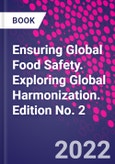Ensuring Global Food Safety: Exploring Global Harmonization, Second Edition, examines the policies and practices of food law which remain top contributors to food waste. This fully revised and updated edition offers a rational and multifaceted approach to the science-based issue of "what is safe for consumption?" and how creating a globally acceptable framework of microbiological, toxicological and nutritional standards can contribute to the alleviation of hunger and food insecurity in the world. Currently, many laws and regulations are so stringent that healthy food is destroyed based on scientifically incorrect information upon which laws and regulations are based.
This book illuminates these issues, offering guidelines for moving toward a scientifically sound approach to food safety regulation that can also improve food security without putting consumers at risk.
Please Note: This is an On Demand product, delivery may take up to 11 working days after payment has been received.
Table of Contents
1. Introduction
Ensuring Global Food Safety: A Public Health Priority and a Global Responsibility
2. Safety and Security: The Cost of Food Regulatory Failure
3. Development of Food Legislation Around the World
4. Integrated Risk Assessment and Cost Benefit Analysis: An Economics Perspective on International Trade and Food Safety
5. The Global Harmonization Initiative
6. Food Safety Regulations within Countries of Increasing Global Supplier Impact
7. A Simplified Guide to Understanding and Using Food Safety Objectives and Performance Objectives
8. Regulating emerging food trends: A Case Study in Insects as Food for Humans
9. Towards Intended Normal Use:�A European Appraisal of the Chloramphenicol Case and some Thoughts on the Potential of Global Harmonization of Antibiotics Regulation
10. RDAs and Intended Normal Use
Efficient Tools in the Universal Management of Risks and Benefits of Micronutrients
11. Global Harmonization of Food Regulations: Benefits and Risks of Organic Food
12. Mycotoxin Management: An International Challenge
13. Novel Food Processing Technologies and Regulatory Hurdles
14. Processing Issues: Acrylamide, Furan and Trans Fatty Acids
15. Food additives and Other Substances Added to Human Food
16. Food Packaging Legislation: Sanitary Aspects
17. Nanotechnology and Food Safety
18. Monosodium Glutamate in Foods and its Biological Effects
19. Responding to Incidents of Low-Level Chemical Contamination in Food
20. Nutraceuticals: Possible Future Ingredients and Food Safety Aspects
21. Nutrition and Bioavailability: Sense and Nonsense of Nutrition Labelling
22. Regulating Nutrition Claims: A Case Study: The First Legislation for Foods with Health Claims in Korea
23. Bioactivity, Benefits and Safety of Traditional and Ethnic Foods
24. Water Determination in Food
25. Global Harmonization of Analytical Methods
26. Global Harmonization of the Control of Microbiological Risks
27. Testing for Food Safety Using Competent Human Liver Cells
28. Harmonization of International Standards
29. Capacity Building: Harmonization and Achieving Food Safety
30. Capacity Building: Building Analytical Capacity for Microbial Food Safety
31. Education in food safety at all levels, from academics to street handlers
Authors
Aleksandra Martinovic Associate Professor, Faculty of Food Technology, Food Safety and Ecology, ?University of Donja Gorica. Aleksandra Martinovic,Associate Professor, Faculty of Food Technology, Food Safety and Ecology - ?University of Donja GoricaDr Aleksandra Martinovic's research interest focuses on the practical application of fundamental knowledge in the field of food safety, microbiology of food, and the development and implementation of new technologies in the food industry.
The Ambassador is the Global Harmonization Initiative (GHI) for Montenegro, the Chair of the Global Interest Harmonization Group (SIG) and the Task Team (TT) Scientific Committees in the European Federation of Food Science and Technology the European Federation of Food Science and Technology, chairman of the meat hygiene working group within the European Hygienic Engineering and Design Group (EHEDG). She is a member of a specialized fish processing group within the European Hygienic Engineering and Design Group (EHEDG).
Dr Martinovic has independently or as a co-author published dozens of scientific papers, a chapter in a scientific monograph issued abroad, a textbook for pre-university level of education, and a study manual. Sangsuk Oh Professor at the department of Food and Nutrition at Ewha Womans University. Professor at the department of Food and Nutrition at Ewha Womans University and former official at the U.S. Food and Drug Administration. Huub Lelieveld formerly Unilever R&D, Vlaardingen, The Netherlands. Prof. dr. h.c. Huub Lelieveld, formerly with Unilever, now President of the Global Harmonization Initiative, a non-governmental organisation working towards globally harmonised and science based food safety regulations, is also a member of the Executive Committee and Past-President of EFFoST (the European Federation of Food Science and Technology), Founder and Past-President of EHEDG (the European Hygienic Engineering and Design Group). He is Fellow of IAFoST (the International Academy of Food Science and Technology), Fellow of IFT (the Institute of Food Technologists), served on the Governing Council of IUFoST (the International Union of Food Science and Technology) and has been Chair of the Nonthermal Processing and International divisions of IFT. At Unilever, he was responsible for hygienic processing and plant design and novel processing technologies.
He is editor or co-editor of many books, on food hygiene, food safety and food processing technologies. He also wrote many chapters for such books as well as hundreds of articles in peer-reviewed scientific journals and in relevant magazines. He is visiting professor at the National University of Food Technologies in Kiev, Ukraine.








